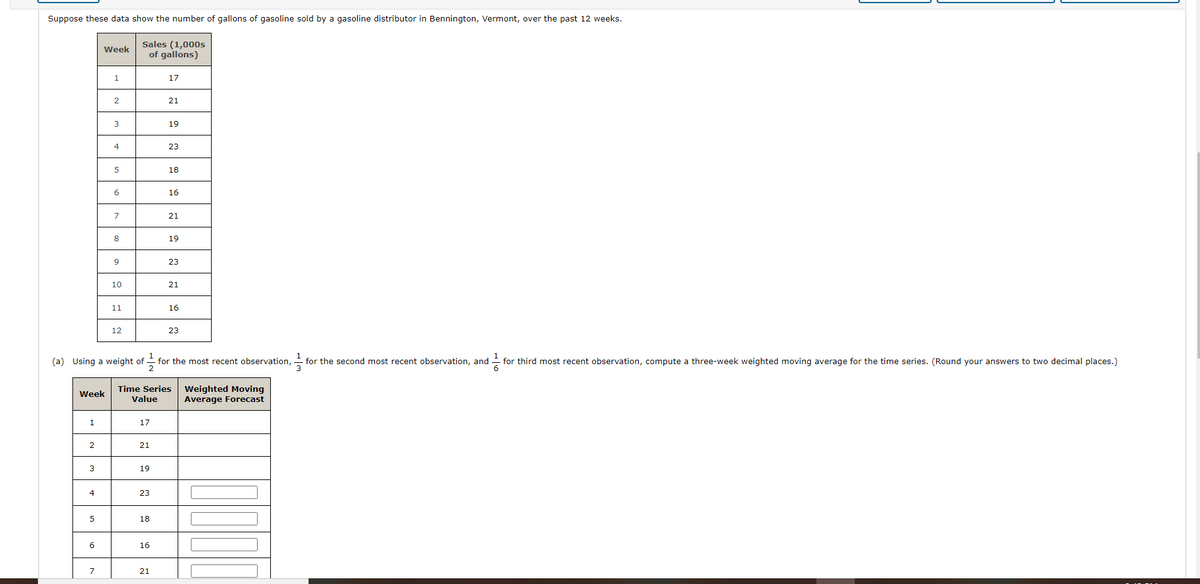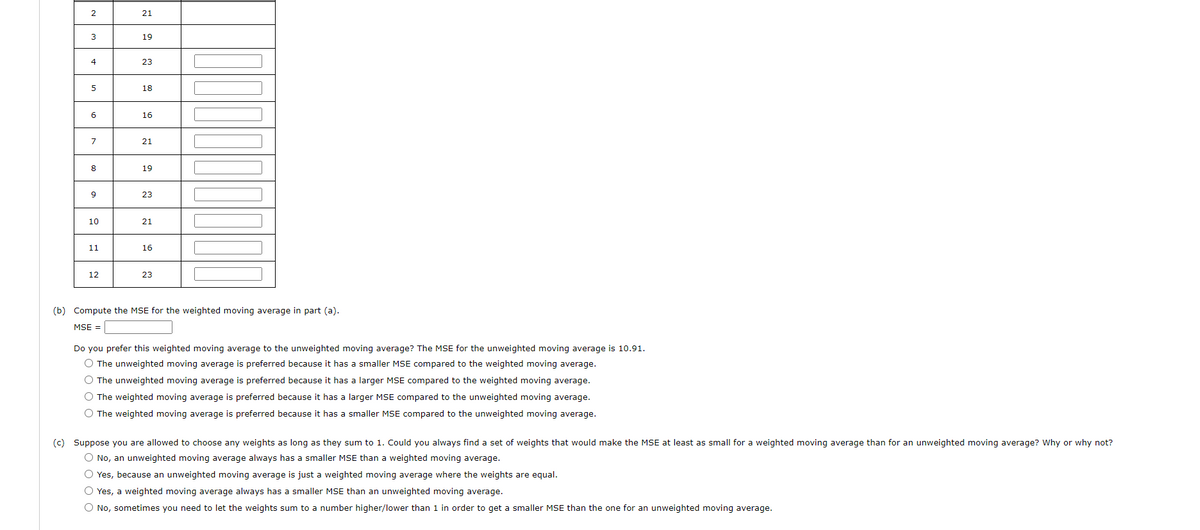Suppose these data show the number of gallons of gasoline sold by a gasoline distributor in Bennington, Vermont, over the past 12 weeks. Sales (1,000s of gallons) Week 17 21 3 19 4 23 18 16 21 19 23 10 21 11 16 12 23 (a) Using a weight of for the most recent observation, for the second most recent observation, and for third most recent observation, compute a three-week weighted moving average for the time series. (Round your answers to two decimal places.) Time Series Weighted Moving Value Week Average Forecast 1 17 2 21 19 23 18 16 21
Suppose these data show the number of gallons of gasoline sold by a gasoline distributor in Bennington, Vermont, over the past 12 weeks. Sales (1,000s of gallons) Week 17 21 3 19 4 23 18 16 21 19 23 10 21 11 16 12 23 (a) Using a weight of for the most recent observation, for the second most recent observation, and for third most recent observation, compute a three-week weighted moving average for the time series. (Round your answers to two decimal places.) Time Series Weighted Moving Value Week Average Forecast 1 17 2 21 19 23 18 16 21
Practical Management Science
6th Edition
ISBN:9781337406659
Author:WINSTON, Wayne L.
Publisher:WINSTON, Wayne L.
Chapter13: Regression And Forecasting Models
Section13.6: Moving Averages Models
Problem 22P: The file P13_22.xlsx contains total monthly U.S. retail sales data. While holding out the final six...
Related questions
Question

Transcribed Image Text:Suppose these data show the number of gallons of gasoline sold by a gasoline distributor in Bennington, Vermont, over the past 12 weeks.
Sales (1,000s
of gallons)
Week
1
17
2
21
3
19
23
5
18
6
16
7
21
8
19
9
23
10
21
11
16
12
23
(a) Using a weight of -
for the most recent observation, for the second most recent observation, and - for third most recent observation, compute a three-week weighted moving average for the time series. (Round your answers to two decimal places.)
Time Series
Value
Weighted Moving
Average Forecast
Week
1.
17
2
21
19
4
23
5
18
6
16
7
21

Transcribed Image Text:21
19
23
18
6
16
7
21
8
19
23
10
21
11
16
12
23
(b) Compute the MSE for the weighted moving average in part (a).
MSE =
Do you prefer this weighted moving average to the unweighted moving average? The MSE for the unweighted moving average is 10.91.
O The unweighted moving average is preferred because it has a smaller MSE compared to the weighted moving average.
O The unweighted moving average is preferred because it has a larger MSE compared to the weighted moving average.
O The weighted moving average is preferred because it has a larger MSE compared to the unweighted moving average.
O The weighted moving average is preferred because it has a smaller MSE compared to the unweighted moving average.
(c) Suppose you are allowed to choose any weights as long as they sum to 1. Could you always find a set of weights that would make the MSE at least as small for a weighted moving average than for an unweighted moving average? Why or why not?
O No, an unweighted moving average always has a smaller MSE than a weighted moving average.
O Yes, because an unweighted moving average is just a weighted moving average where the weights are equal.
O Yes, a weighted moving average always has a smaller MSE than an unweighted moving average.
O No, sometimes you need to let the weights sum to a number higher/lower than 1 in order to get a smaller MSE than the one for an unweighted moving average.
in
Expert Solution
This question has been solved!
Explore an expertly crafted, step-by-step solution for a thorough understanding of key concepts.
Step by step
Solved in 4 steps with 5 images

Recommended textbooks for you

Practical Management Science
Operations Management
ISBN:
9781337406659
Author:
WINSTON, Wayne L.
Publisher:
Cengage,

Contemporary Marketing
Marketing
ISBN:
9780357033777
Author:
Louis E. Boone, David L. Kurtz
Publisher:
Cengage Learning

Marketing
Marketing
ISBN:
9780357033791
Author:
Pride, William M
Publisher:
South Western Educational Publishing

Practical Management Science
Operations Management
ISBN:
9781337406659
Author:
WINSTON, Wayne L.
Publisher:
Cengage,

Contemporary Marketing
Marketing
ISBN:
9780357033777
Author:
Louis E. Boone, David L. Kurtz
Publisher:
Cengage Learning

Marketing
Marketing
ISBN:
9780357033791
Author:
Pride, William M
Publisher:
South Western Educational Publishing